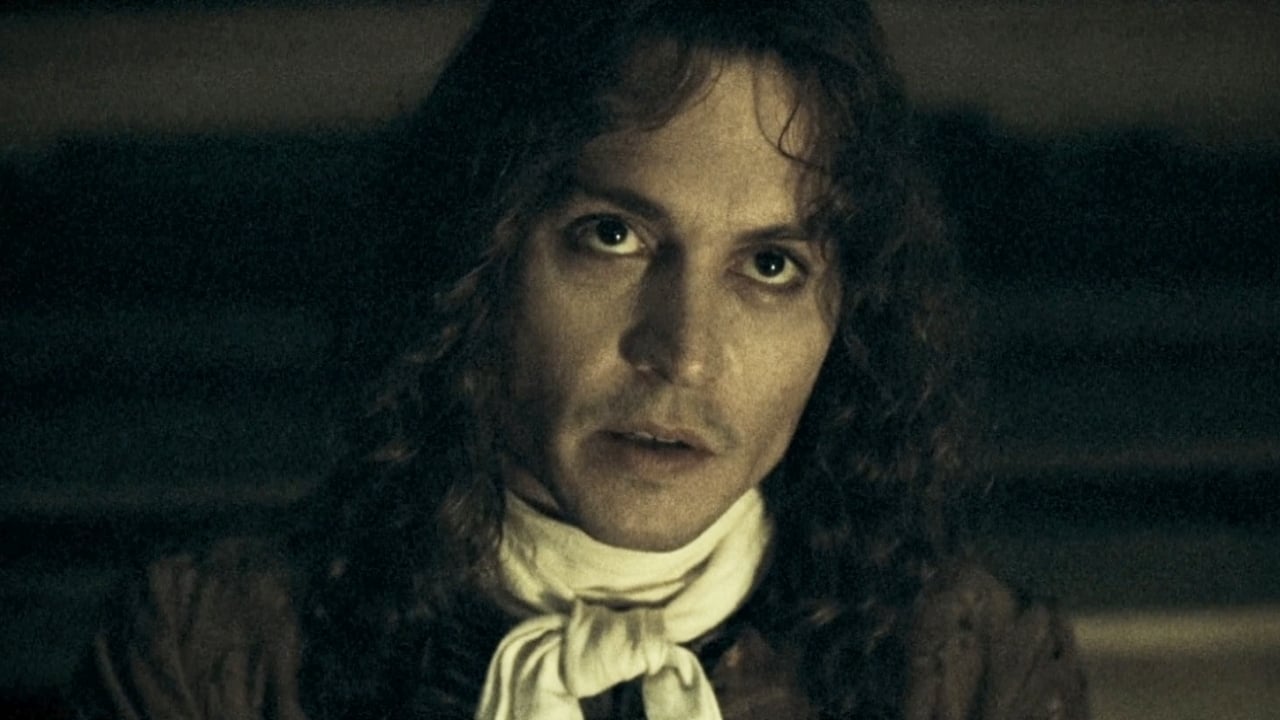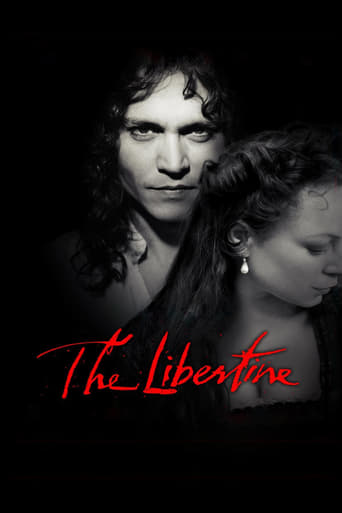



the leading man is my tpye
Stylish but barely mediocre overall
It’s fine. It's literally the definition of a fine movie. You’ve seen it before, you know every beat and outcome before the characters even do. Only question is how much escapism you’re looking for.
View MoreStrong acting helps the film overcome an uncertain premise and create characters that hold our attention absolutely.
View MoreThe story of John Wilmot, the Earl of Rochester, playwright and poet of the 17th century, the man who led a bohemian life to the extreme and drove himself to early grave at 33. This role brought Johnny Depp award for the most offensive male role (Women Film Critics Circle Awards) and there are also fantastic John Malkovich, funny Richard Coyle and beautiful Rosamund Pike. Sex, drugs and rock and roll in the manner of 17th century. :D8/10
View MoreAlthough its dour tone might put off a lot of viewers, Johnny Depp gives an awards-worthy performance as the 2nd Earl of Rochester, John Wilmot, one of the most controversial figures in British history. The film is based on a stage play by Stephen Jeffreys and focuses on the last years of Wilmot's life as he goes from being one of Britain's most celebrated poets and playwrights to practically drinking himself to death, all while being one of the most unsavory and unlikeable people I've ever seen portrayed on screen.I must give Johnny Depp credit because he turned in one of his finest performances. Even though his penchant for dressing up and putting on an accent in almost every movie he's done recently has reached the point of self-parody, it feels more natural and fresh here. However, the rest of the cast is no slouch either. John Malkovich gives a restrained performance as Charles II (reprising his stage role) and Samantha Morton also does well as Elizabeth Barry, an actress who Wilmot tutors then has an affair with. Also making appearances are Jack Davenport (Jack Sparrow's nemesis in Pirates of the Caribbean) as one of his friends, and Rosamund Pike as his wife, Elizabeth Malet. Obviously, now, Rosamund Pike has come into her own as an actress with GONE GIRL, but her supporting work here shows the chops she brought to that more recent role, even if she wasn't given a whole lot to do.Still, there will be some issues with this film for some. The big one is the cinematography. I've seen it described as murky or grainy, and while that might be true to an extent, I don't really see it as a serious problem. For one, this film was shot with mostly natural light, if not all, and the lack of vibrant color is appropriate to the overall tone of the film and Wilmot's character as portrayed therein (or at least how he views life). As a libertine, he saw life as banal and went out of his way to make things more interesting for himself by being an all-around jerk and debauching all of the time. Personally, I didn't mind this either, but I can see how others might not like him, especially when he goes out of his way to make this clear to others (and the audience, at the beginning and end) just how unlikeable and how much of a cynic he is. My way into the film and his character was an icy and sardonic sense of humor, which was employed often.Towards the end, it tries to be a little sentimental by showing his physical deterioration, and while this was still done effectively it undermined what came before it slightly. Despite my slight misgivings about the way things turn out in the final act, one of the best scenes in the entire film is in this section.Overall, this isn't a film I'd necessarily return to, but I don't regret having watched it given how depressing it is. The score which accompanied it was decent enough and, despite what you might feel about the look of the film, it meshes well with the overall tone and Depp's performance. Just don't go in expecting him to be as cheery, optimistic or likable as he is in almost everything else he's done.
View MoreI bought this film on DVD yesterday, and my expectations were very high. One of the reason was because of the great cast. Johnny Depp, John Malkovich, Samantha Morton, Rosamound Pike, Tom Hollander among others. I had never heard of the film's director, Laurence Dunmore. So it was nice with a debut-film.The film's opening prologue was amazing. It gives us an idea what kind of person The Earl of Rochester (Johnny Depp) is. We are introduced to a muddy, grainy and raw London. We are also introduced to other characters: King Charles II (John Malkovich), George (Tom Hollander), Mrs Rochester (Rosamound Pike), Elizabeth Barry (Samantha Morton).All of the characters are well developed and good. The actors gives us very good and credible performances. In particular Johnny Depp. That guy is great. One of the greatest actors of his generation. Like other actors of course, he has been involved with movies that aren't so good. But he never fails to deliver a good performance though. In this movie he gives an Oscar-worthy performance. His character is so despicable and non-likable, that you just hate him from the very beginning. But later in the film, he kind of changes, and you actually gets an chance to sympathize with him. Depp gives us a wide river of emotions. Anger, loss, love, arrogance, sadness. A performance of a lifetime. He's just phenomenal.Dunmore's direction is good. He knows what he wants with this story, and how the environments are gonna look like. The screenplay is very well-written. There's a lot of humor in the film. In some parts to say the least. The dialog is very witty, cynical, and just completely wonderful. There's a lot of bad language like "fuck", "cunt", "prick" etc.I give this movie 8 out of 10. A strong 8 of 10
View More"You will not like me," Depp as John Wilmot, 2nd Earl of Rochester, states at the beginning of the film. This story is about the issue of actors and playwrights being either liked or disliked on and off the stage. Although the events take place in the late 17th century, the issues about acting and performance are the same as they are today. The audience will either love you or hate you. There is little in between.For 10 years, from 1649 to 1660, England and Scotland became a Republic under the Puritan leadership of Oliver Cromwell. The theaters were closed, gambling banned, drinking discouraged, and Bible study became mandatory. (However opera did continue.) Sort of the 17th-century equivalent of the southern Bible-Belt in the United States several centuries later.When Charles II became king and restored the throne in 1660, the Puritan restrictions were lifted. The theaters were reopened along with the brothels and the ale houses. As a result the country's libido went sort of wild. Sex, drinking, and gambling came back into vogue full force--things that make life worth living. Apparently, St James Park and other places in London became a hot spot for orgies that would give the bordellos of the 19th century a run for their money.This swinging of the "moral" pendulum toward a libertine sensibility manifested itself through the voices of playwrights and poets. Bawdy and risqué theater, poems and songs became all the rage and is often called "Restoration Comedy". No poet/playwright of the era was more bawdy and risqué than the young John Wilmot, 2nd Earl of Rochester. He led a double-life as a poet/playwright of Restoration Comedy but was also a member of the House of Lords."The Libertine" is a cinematic portrait of John Wilmot, 2nd Earl of Rochester, as the most liberated and uninhibited of the playwright-poets of the era, which also included the likes of John Dryden and George Etheridge. According to the film, Rochester doesn't just write risqué plays and poems. He lives the life of a sex-fiend and an alcoholic, constantly looking for sex and drink when he's not working at the theater. He is considered simultaneously brilliant and erratic; he is his own worst enemy as he neglects his duties as a nobleman. He was one of the few members of the House of Lords who commiserates with theater artists. He begins training a young woman in acting who is at first reviled by the audience at a performance. They then become lovers.Rochester is commissioned by his friend and patron, King Charles II, to write a spectacular play to impress ambassadors from France. But little does the king know that Wilmot's intentions are far from honoring his king. Behind the scenes, Wilmot trashes his sovereign and the entire institute of the monarchy, and he reveals that these opinions will be manifested in his work. During the performance in which the king and the French are in attendance, the ambassadors say his play (which I will not give away) would cause King Louis XIV of France to hang the playwright.Underneath the bawdiness of the era is a kind of somber undertone, a lack of depth of feeling and honesty which may be the main point of the film. Certainly, they threw off the shackles of Puritanism but also may have inadvertently put on a different kind of bondage, missing out on the comforts of love and fulfillment. The bawdy songs and the sex orgies are fun but have little to do with love and real relationships. The entire look of the experience is somewhat reminiscent of the darker filters used in the Godfather. Much of the landscape is probably relatively true to what the time and place was like. We still have the palaces, the music, the poems, and the books from the era. What we don't have are the strange mix of unease and monarchy in an era that was still trying to figure out what it wanted to be. Or do we? An incredible and underrated film.
View More